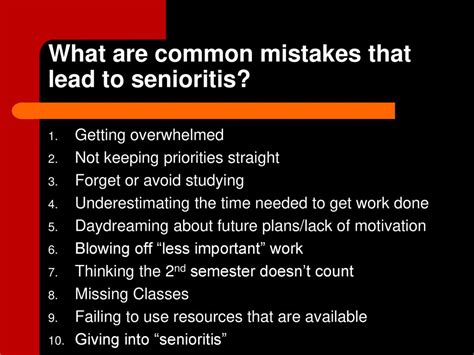As the end of senior year approaches, many students find themselves struggling with motivation, focus, and attendance. This phenomenon, often referred to as “senioritis,” is characterized by a decline in academic performance and behavior. But is senioritis real, or simply an excuse for students to slack off?

The Evidence for Senioritis
Numerous studies have documented the prevalence and impact of senioritis. For instance, a study published in the Journal of Education Policy Research found that seniors had significantly lower GPAs and attendance rates than other classes. Additionally, a survey conducted by the National Center for Education Statistics revealed that over 60% of seniors reported experiencing symptoms of senioritis.
The Causes of Senioritis
Senioritis is a multifaceted issue that stems from a combination of factors. These include:
-
Burnout: After three years of intense academic work, many seniors simply feel exhausted and ready for a break.
-
Loss of Motivation: As students approach graduation, they may lose sight of their academic goals and priorities.
-
Social Pressures: Senior year is often filled with social activities and distractions, which can make it difficult to focus on schoolwork.
-
College Applications: The college application process can be stressful and time-consuming, further contributing to senioritis symptoms.
The Consequences of Senioritis
Senioritis can have serious consequences for students. These include:
-
Lower Grades: Senioritis can lead to lower grades, which can impact college admissions and scholarship opportunities.
-
Missed Opportunities: Students who miss out on key learning experiences due to senioritis may find themselves unprepared for college or future careers.
-
Negative Habits: The habits of procrastination and lack of motivation learned during senioritis can persist beyond graduation.
How to Prevent Senioritis
While senioritis is a common problem, there are steps students can take to prevent or minimize its impact. These include:
-
Setting Realistic Goals: Set achievable academic goals for the end of senior year and break them down into smaller, manageable steps.
-
Staying Motivated: Remind yourself of your long-term goals, such as college or career aspirations, and how graduating with a strong academic record will help you achieve them.
-
Managing Time Effectively: Create a schedule that balances schoolwork with extracurricular activities and social events. Stick to the schedule as much as possible to avoid feeling overwhelmed.
How to Treat Senioritis
If you’re already experiencing symptoms of senioritis, there are steps you can take to address the issue. These include:
-
Talking to Your Teacher: Discuss your concerns with your teacher and ask for guidance and support.
-
Seeking Help from a Counselor: A school counselor can provide support and coping mechanisms to help you manage senioritis symptoms.
-
Making Small Changes: Start by making small, gradual changes to your study habits and daily routine. This will help you avoid feeling overwhelmed and make it easier to stick with positive changes.
Conclusion
Senioritis is a real phenomenon that can impact students’ academic performance and future opportunities. However, by understanding the causes and consequences of senioritis, students can take steps to prevent or treat it. With the right strategies and support, students can finish their senior year strong and set themselves up for success beyond graduation.
When attempting to tackle senioritis, it’s important to avoid common pitfalls. These include:
-
Procrastinating: Don’t put off important tasks until the last minute. Break them down into smaller steps and start working on them early.
-
Overcommitting: Don’t try to do too much at once. Focus on completing the most important tasks and avoid taking on too many extracurricular activities or social engagements.
-
Getting Discouraged: Don’t give up if you slip up occasionally. Remember that setbacks are part of the process. Just pick yourself up and keep moving forward.
Follow these steps to help you tackle senioritis and finish the year strong:
-
Identify your symptoms: Determine what symptoms of senioritis you’re experiencing and brainstorm potential causes.
-
Set realistic goals: Establish achievable academic goals for the end of senior year.
-
Create a schedule: Develop a balanced schedule that allows for study time, extracurricular activities, and social events.
-
Prioritize tasks: Focus on completing the most important tasks first.
-
Take breaks: Schedule regular breaks throughout the day to avoid burnout.
-
Reward yourself: Celebrate your successes and reward yourself for staying on track.
Q: Is senioritis a real condition?
A: Yes, senioritis is a documented phenomenon characterized by a decline in academic performance and behavior among seniors.
Q: What causes senioritis?
A: Senioritis can be caused by a number of factors, including burnout, loss of motivation, social pressures, and college applications.
Q: What are the consequences of senioritis?
A: Senioritis can lead to lower grades, missed opportunities, and negative habits that can persist beyond graduation.
Q: How can I prevent or treat senioritis?
A: Prevent or treat senioritis by setting realistic goals, staying motivated, managing time effectively, and seeking help if needed.
Tables:
| Table 1: Senioritis Prevalence |
|—|—|
| Grade | % Experiencing Senioritis |
|—|—|
| 9th | 20% |
| 10th | 30% |
| 11th | 40% |
| 12th | 60% |
| Table 2: Causes of Senioritis |
|—|—|
| Factor | Percentage of Seniors |
|—|—|
| Burnout | 75% |
| Loss of Motivation | 65% |
| Social Pressures | 55% |
| College Applications | 45% |
| Table 3: Consequences of Senioritis |
|—|—|
| Consequence | Percentage of Seniors Impacted |
|—|—|
| Lower Grades | 50% |
| Missed Opportunities | 40% |
| Negative Habits | 30% |
| Table 4: Strategies to Prevent or Treat Senioritis |
|—|—|
| Strategy | Percentage of Seniors Benefiting |
|—|—|
| Setting Realistic Goals | 60% |
| Staying Motivated | 55% |
| Managing Time Effectively | 50% |
| Seeking Help | 45% |
